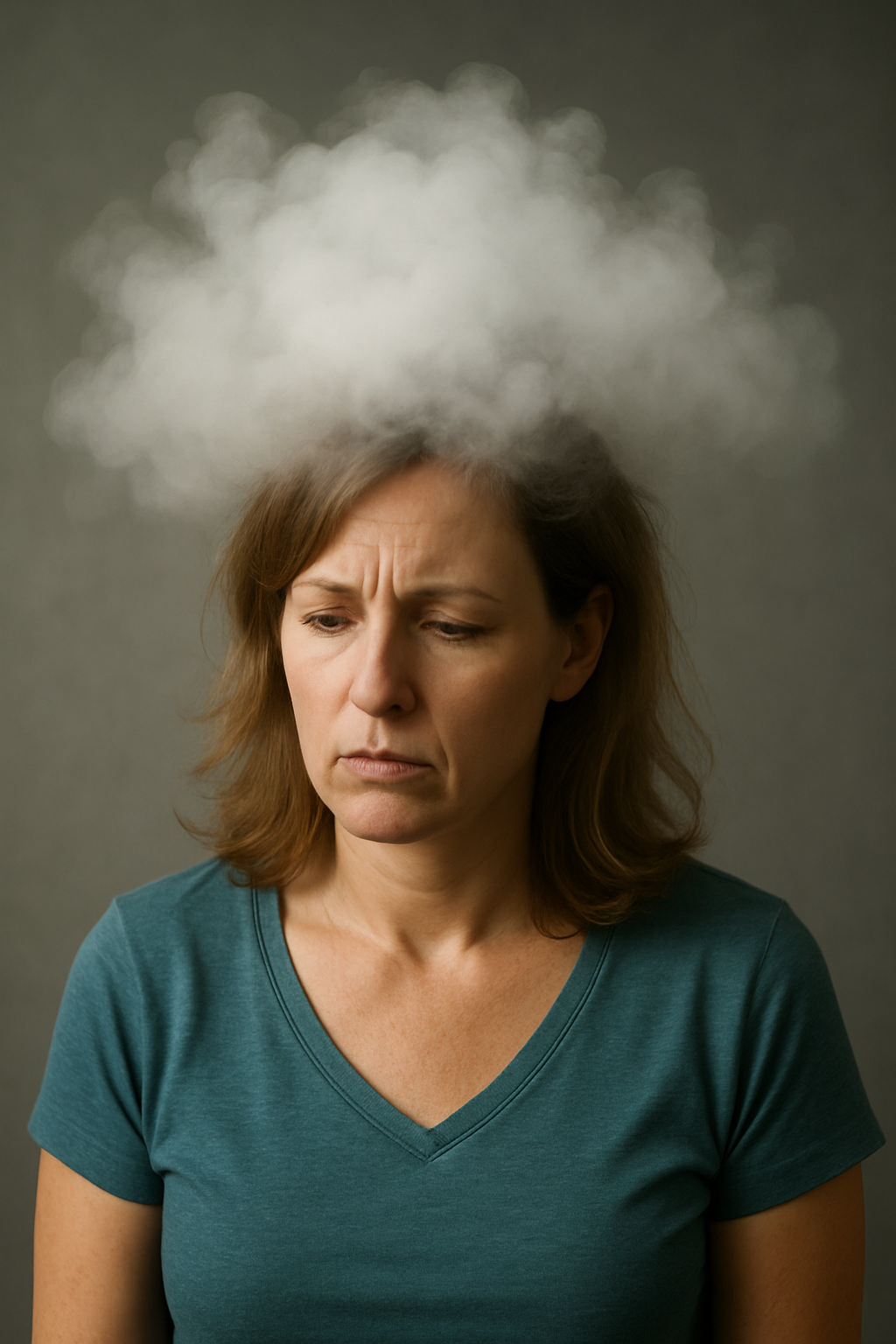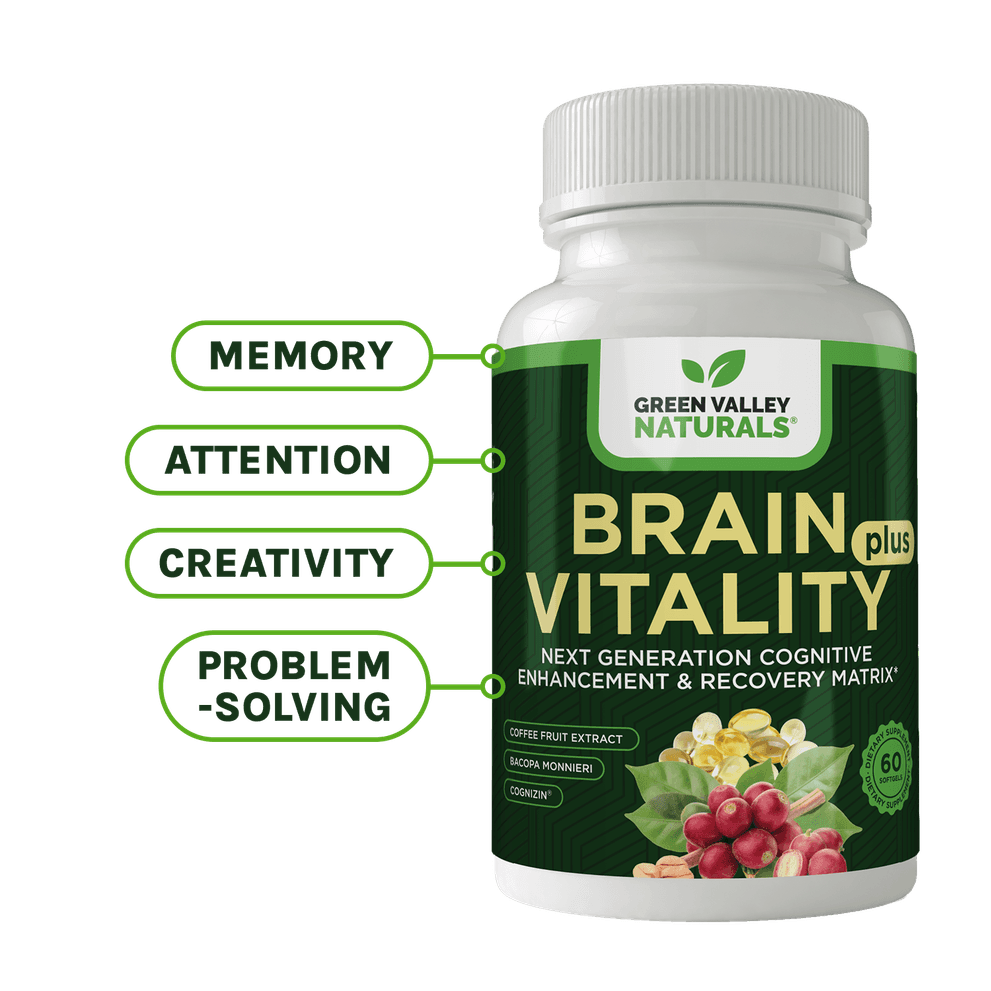
If you’re in the thick of menopause and feeling like your brain has gone missing—misplacing keys, forgetting names, or zoning out mid-sentence—you’re not imagining things. That frustrating “menopause brain fog” is very real. But here’s the good news: you don’t have to accept it as your new normal. In fact, a variety of natural, research-backed supplements can help you reclaim your clarity, focus, and energy—no prescription hormones required. Curious which ones actually work? Keep reading for the top 10 menopause brain fog supplements that can help you feel like yourself again.
Key Takeaways
Estrogen and progesterone drops are major contributors to menopause brain fog, but nutrient deficiencies, poor sleep, and stress also play a significant role.
Top natural supplements like B-complex, Citicoline, magnesium L-threonate, and omega-3s can significantly improve memory, focus, and clarity during menopause.
Combining supplements with lifestyle strategies like a Mediterranean diet, regular exercise, and quality sleep leads to the best brain fog relief.

Understanding Symptoms of Brain Fog in Menopause
What is menopause?
Menopause is the natural stage in a woman’s life when her periods permanently stop, and she can no longer become pregnant. It usually happens between ages 45 and 55 and is triggered by a drop in the hormones estrogen and progesterone.
So what’s the difference between perimenopause, menopause, and postmenopausal women?
Perimenopause combines the prefix “peri-” which means “around” or “surrounding” (from the Greek peri-, to encircle) and the word menopause. It usually starts in a woman’s 40s and can last four to ten years before menopause. During this time, estrogen and progesterone levels fluctuate wildly, periods become irregular, and symptoms can include hot flashes, night sweats, sleep disturbances, menopause brain fog, and decreased fertility—though pregnancy is still possible.
You officially move from perimenopause to menopause once you’ve gone 12 consecutive months with no period, generally around age 51 in the U.S. At that time, ovaries stop releasing eggs, estrogen drops sharply, and periods stop completely.
Common menopause symptoms include hot flashes and night sweats, disrupted sleep quality, mood changes, brain fog, weight gain and slowed metabolism, thinning hair, and skin and vaginal dryness.
Postmenopausal women have lower but more stable hormone levels for the rest of their lives. Fertility is permanently gone. Some brain fog improves (but not always completely), and hot flashes may fade over years. But risks of osteoporosis, heart disease, and urinary problems increase.

Symptoms of menopause brain fog
Menopause is a common brain fog trigger due to all the hormonal fluctuations. So it’s no surprise that brain fog is one of the most common menopause complaints.
Estrogen, an ovarian hormone, plays a key role in supporting brain health. Estrogen changes during perimenopause and menopause play a central role in causing menopause brain fog. It's likely that other factors such as sleep issues, stress, sedentary lifestyle, and nutritional deficiencies play a supporting role.
It's not just estrogen that can wreak havoc on your hormones and your brain function. The loss of progesterone is just as profound a loss to your brain as estrogen. Progesterone interacts with GABA receptors in the brain to help you feel calm. With less circulating progesterone, it's not surprising to find yourself feeling more anxious, worried, and forgetful.
Some of the most common symptoms of menopause brain fog include:
Forgetfulness—misplacing keys/phone, walking into a room and forgetting why, missing appointments or tasks
Trouble concentrating—difficulty staying focused on work or conversations, zoning out
Mental fatigue—feeling mentally sluggish or slow, with reduced stamina or motivation
Struggling to remember names or common words (“tip-of-the-tongue”)
Slower processing speed—taking longer to make decisions or respond to questions
Menopausal brain fog affects more than 60% of women.
How long does it last? Evidence shows improvement over time—better mood regulation, cognitive health, working memory, fewer sleep problems, higher energy—but issues can last years.
There's no actual "cure" for menopause symptoms including menopause brain fog. But there is hope for hot flash relief and brain fog relief, with the right brain-friendly supplements and supporting lifestyle actions. And it doesn't even require sitting in front of a fan!
So move over, poor sleep and cognitive issues. Menopausal women can overcome poor concentration, sleep quality problems, and depressive symptoms and feel great again.
This guide lays out the best research-based menopause brain fog relief supplements and how they can help. These top cognitive supplements menopause include a variety of nutrients that support general brain health conditions besides menopause brain fog, too.
Nutrition and Menopause Related Brain Fog
Your brain -- whether you're in menopause or not -- is very demanding of the nutrients it needs for cognitive performance and mood regulation, among other important tasks. Any time you have difficulty concentrating, whether or not you're in the menopause transition, it's worth taking dietary supplements and herbal remedies to improve cognitive symptoms. Here are the best of the best supplements for menopause brain fog.
The Role of B Vitamins
B vitamins play a powerful role in reducing menopause brain fog by helping support brain health, energy levels, and mood regulation -- all of which are commonly compromised during the menopause transition.
B vitamins, especially B12, play a central role in cognitive performance and in preventing cognitive decline. The B vitamins are also needed for health energy levels, nerve function, and immune health.
Many menopausal women are at risk of B vitamin deficiency, especially if their diet is primarily based on packaged processed foods, restaurant foods, and/or plant-based diets. B complex deficiency can exacerbate brain fog and cognitive issues. Conversely, B complex supplements can help alleviate menopause brain fog and support cognitive performance.
How B vitamins offer menopause brain fog relief
Vitamin B6-supports serotonin and dopamine production, stabilizes mood and focus, reduces irritability and mental fatigue.
Folate(B9 in its absorbable form) - supports neurotransmitter production, cellular repair, memory and mental clarity, and reduces homocysteine which is linked to cognitive decline
Vitamin B12 (Cobalamin) - needed for nerve health, mental sharpness, red blood cell production. Deficiency is linked to memory loss, confusion, and depression. Many older women have reduced ability to absorb B12, and B12 is a common deficiency.
Vitamin B1 (Thiamine) & B2 (Riboflavin)-help convert food into energy for brain and body. Deficiencies can lead to mental sluggishness.
Look for methylated forms of B9 (methylfolate) and B12 (methylcobalamin) for best absorption.
Always consult your healthcare provider before starting new supplements, even water-soluble B vitamins.

Top 10 Supplements for Menopause-Related Brain Fog
Menopause relief can come surprisingly fast, along with improvements in cognitive health and other brain function, reduced depressive symptoms, and even joint health. Even when using dietary supplements instead of prescription medication... and with far less risk than prescriptions.
The timeline for seeing improvements with supplements such as B vitamins, citicoline, magnesium, omega-3 fatty acids, and others named below varies from person to person. Many women start noticing changes within one to four weeks, and greater improvements with 6 to 12 weeks of consistent use. The operative word here is "consistent." Make it part of your daily meal plan.
Nutrients support brain health gradually by reducing inflammation, boosting neurotransmitter function, and restoring nutrient levels.
Brain fog during menopause is often exacerbated by hormonal fluctuations, so reduce symptoms by co-managing other lifestyle co-factors including sleep quality, stress, and diet.
1. B-Complex and Methylated B12
Vitamin B complex may be one of the most helpful menopause supplements via its support of various body systems affected by hormonal swings during perimenopause and menopause.
B vitamins help with menopausal brain fog by supporting neurotransmitter production, nerve health, brain energy, and blood flow to the brain. Vitamins B6, B9 (folate), and B12 are especially important for regulating mood, memory, and mental clarity. They help reduce homocysteine—an amino acid linked to cognitive decline, poor memory, and difficulty concentrating.
Each B vitamin addresses different body systems, including digestive issues, joint health and physical activity, lean muscle mass, cognitive function, and other menopausal symptoms. These systems are impacted by changing hormone levels throughout perimenopause and menopause.
B vitamin intake is important because they're water soluble and need to be replaced regularly. Menopausal women may be low due to age-related absorption issues combined with hormonal shifts. Also, vegan and vegetarian diets tend to be low in B vitamins. And stress, alcohol use and other factors can increase demand and reduce absorption.
B vitamins fuel the brain’s ability to think clearly, adapt to stress, and maintain focus during the hormonal tumultuousness of menopause. If you feel like your brain and body are lethargic, give B-complex a try.. One Reddit user (not a menopausal woman, but this still gives you a great overview), said:
“I have consistently felt amazing every single day since I started taking a B-complex. It turns me into an absolute powerhouse. I feel like I can shovel through office work like its nothing, My productivity went up dramatically to the point to where I can confidently say that B-complex has been life changing for me.”
2. Citicoline (Cognizin)
Citicoline (brand name Cognizin) helps reduce menopausal brain fog by boosting levels of acetylcholine, a key neurotransmitter involved in memory, focus, and mental clarity... all of which tend to decline during menopause.
Citicoline also helps repair brain cell membranes and enhances mitochondrial energy production, thus improving overall brain function. Research shows that Citicoline may boost attention and working memory, making it especially helpful when hormonal changes impact cognitive performance and make you feel as if you'd fail a cognitive test.
3. Coffee Fruit (Neurofactor®)
NeuroFactor® is a patented extract from the whole fruit of the coffee arabica plant. It helps fight menopausal brain fog by increasing Brain-Derived Neurotrophic Factor (BDNF)—a key protein that supports neuroplasticity, memory, and overall cognitive performance.
During menopause, declining estrogen levels can pummel BDNF levels, triggering memory lapses and mental fatigue. NeuroFactor® helps counteract this by stimulating the brain’s ability to grow and strengthen neural connections, which aids clarity, focus, and mood. Studies show that a single dose can significantly raise BDNF levels, making it a promising, stimulant-free addition to brain fog support stacks.
We hear your concern about extra caffeine. And no, coffee fruit has no caffeine. It has the caffeine removed during extraction, making it perfect for those who want the mental boost with no jittery side effects. .

4. Magnesium (Glycinate/L-threonate)
Magnesium performs hundreds of functions in the body. It is critical for both cognitive function and sleep.
An estimated 50 to 60% of U.S. adults are either magnesium deficient or getting less than the recommended daily intake, according to data from the USDA and various health surveys. This widespread deficiency is due to poor dietary intake, alcohol consumption, soil depletion, chronic stress, and prescription medications that deplete magnesium such as PPIs, birth control pills, and diuretics. Best food sources include pumpkin seeds, chia seeds, almonds, and cooked spinach.
Magnesium L-threonate and magnesium glycinate are two highly absorbable forms of magnesium that offer powerful support for cognition and sleep during menopause—when hormone shifts can lead to brain fog, anxiety, and restless nights filled with hot flashes.
Magnesium L-Threonate: Gets into the Brain
Magnesium L-Threonate crosses the blood-brain barrier, so it directly increases magnesium levels in the brain.
L-Threonate has been shown in studies like the 2010 MIT study, to enhance learning, working memory, and synaptic plasticity, which helps combat brain fog and forgetfulness during the menopausal transition. It may also support emotional balance and resilience to stress, which are especially important during hormonal changes.
Magnesium Glycinate: Calming and Sleep-Friendly
Magnesium glycinate pairs magnesium with glycine, a calming amino acid that promotes relaxation and improves sleep quality.
Magnesium glycinate helps regulate GABA, the brain’s main calming neurotransmitter, which can be disrupted during menopause and trigger nighttime hot flashes, anxiety, and insomnia.
Magnesium glycinate is gentle on the stomach and therefore unlikely to cause loose stools, making it ideal for regular use.
Together, they're great for cognitive function and sleep. L-threonate excels at mental clarity and memory. Glycinate calms the nervous system and improves sleep.

5. Omega-3 fish oil
Omega-3 fatty acids are called essential fats -- as they're nutrients your body needs for optimal function but you have to ingest them. Your body cannot make them internally.
Omega-3s are healthy fats that contain docosahexaenoic acid (DHA), as well as eicosapentaenoic acid (EPA). Both are known for their key role in brain health and cognitive function. They help brain function by maintaining the integrity of your brain cells and neurotransmitter production (serotonin and dopamine). They possess anti inflammatory properties, improve blood flow to the brain, and strengthen synaptic communications for a better working memory and cognitive well being.
The typical American diet is woefully deficient in EPA and DHA -- being found mostly in cold water fatty fish, algae and seaweed, which are foods most Americans avoid. So a high quality Omega-3 dietary supplement can come in handy.
While not everyone has the same results, one Reddit user said about fish oil (in combination with Alpha Brain), "I feel like I'm on speed. This is the first time I've felt "awake" in probably a year."
Many medical professionals praise omega-3s as a way to manage high blood pressure and reduce risk of cardiovascular disease, even for people who have not reached menopause.
6. Creatine
Creatine is a naturally-occurring, organic compound that is mostly stored in your muscles, and is found in much smaller quantities in your brain. Women have been found to have lower creatine levels in the brain.
Creatine is perhaps best known for its role in muscle energy production. It also supports brain health by boosting cellular energy metabolism, which helps fight brain fog during menopause. As estrogen levels fall, so does mitochondrial efficiency in the brain, contributing to menopause symptoms such as forgetfulness, fatigue, and poor concentration.
Creatine helps replenish ATP, which is the brain's primary energy source. Emerging evidence suggests creatine may improve mental clarity, working memory, and resilience to stress. And that makes it a promising tool for women experiencing a slowdown in cognitive function during perimenopause and menopause.
Creatine is naturally supplied in meat and fish, but can also be taken as a dietary supplement, which is especially important if you follow a diet only consisting of plant compounds.
7. Lion's Mane
Lion’s mane is a medicinal mushroom known for its remarkable ability to support neuroplasticity, making it a powerful natural ally for mental clarity during menopause.
One of its key benefits lies in its stimulation of nerve growth factor (NGF)—a protein needed for the growth, repair, and survival of neurons. As women enter menopause and their estrogen levels decline, cognitive functions like memory, focus, and processing speed can take a hit. Lion’s mane helps counteract this by promoting the regeneration of brain cells and strengthening connections between neurons, which supports sharper thinking and long-term brain health.
Besides its brain-boosting effects, Lion’s mane also offers gentle support for mood and stress resilience, which are closely tied to cognitive clarity. Many menopausal women report feeling more mentally grounded and less foggy after regular use.
Start slowly at 500 mg to assess tolerance. Take it early in the day, as it can be energizing. Avoid if you have mushroom allergy.
8. L-Theanine
L-theanine is an amino acid found naturally in green tea. It can be helpful for menopausal brain fog by promoting a state of calm clarity without sedation. During menopause, hormonal fluctuations often lead to anxiety, sleep disturbances (hot flashes), and mental fatigue, all of which contribute to cognitive issues.
L-theanine increases alpha brain waves, which promotes a calm, focused mental state. It helps you gain clearer thinking even under pressure.
In addition, L-theanine helps you fall asleep more readily and boosts sleep quality, without being a sedative. It may be especially helpful for middle-of-the-night waking that's common in perimenopause and menopause.
Studies also show that L-theanine can improve attention span and boost mental performance. It supports dopamine and GABA, two important neurotransmitters involved in mood, motivation, and calm. It supports deep and restorative sleep, something many menopausal women struggle with.
9. Bacopa (Bacomind®)
Bacopa monnieri is an herbal remedy in the Ayurvedic tradition, and is best known for its cognitive-enhancing effects. It's especially helpful for menopausal brain fog due to its ability to support memory, focus, and stress resilience during hormonal fluctuations.
Bacopa boosts memory, focus, and mental clarity. It's been shown in multiple clinical studies to enhance working memory, verbal recall, and learning speed -- all of which are often compromised during perimenopause and menopause.
Correspondingly, bacopa reduces anxiety and mental fatigue that often accompanies mood swings, irritability, and stress. During stressful situations Bacopa has been shown to improve attention and focus.
Bacopa monnieri supports ongoing brain health and neuroplasticity and protect neurons from oxidative stress.
Long story short, Bacopa is a gentle yet powerful herb that helps clear menopausal brain fog, sharpen focus, and ease stress-related mental fatigue in menopause. Which makes it a smart addition to this list of brain supporting menopause supplements.
BacoMind® is a trademarked, standardized extract of Bacopa monnieri, and one of the most well-researched Bacopa formulations. It's specifically standardized to 45% bacosides, the active compounds shown to support memory, focus, and mental processing speed.
10. Methylene Blue (MB)
Methylene blue is a compound with exciting potential for boosting cognitive function, energy metabolism, and mood -- all of which can decline during menopause as swinging hormones lead to brain fog, fatigue, and memory lapses.
Methylene blue acts as an electron carrier, helping cells produce more brain energy. This is especially valuable during menopause when falling estrogen levels reduce mitochondrial efficiency and lead to mental fatigue.
Low doses of methylene blue have been shown to improve working memory and attention, perhaps by protecting brain cells from oxidative stress and enhancing blood flow to the brain. It also promotes neuroplasticity, the brain's ability to form new connections, which not surprisingly aids learning and recall. Methylene blue may also support dopamine production, thereby lifting mood.
Benefits of MB include:
Improves memory by increasing brain cell respiration
Boosts mitochondrial function
Protects nerve function
Improves cognition
Boosts brain energy
Increases MRI activity during sustained attention and short-term memory tasks
Supports healthy blood pressure
Methylene blue should be taken in very low doses, generally less than 1 mg/kg of body weight. High doses can be toxic, and can interfere with prescription medications. MB is an MAO inhibitor and therefore can also interact with (SSRI) and MAO inhibitors. As always, consult your healthcare practitioner before starting this or other supplements.
Other Brain Fog Lifters For Women Over 50
Many people jump straight to hormone replacement therapy when they experience menopause symptoms including brain fog. And that's not without merit -- provided you're working with a holistic practitioner and using bio-identical hormones for support. Bio-identical progesterone can offer good support.
But taking supplements can often supply nutrients that may have gone missing throughout years of childbearing, stress, and monthly hormone fluctuations. Some menopause symptoms may be related to overall health deficiencies, not just hormones. Evaluate how much hormone therapy you need, with the help of a qualified natural physician.
Lifestyle modifications are also a pivotal part of ousting brain fog from your life. Sure, you can use dietary supplements and herbal remedies. But a core factor is the food you eat. You can't supplement away a crappy diet of fast food or packaged food.
Arguably the best and most healthful diets on the planet are the traditional Mediterranean diet (not the modern westernized version). It's based on a variety of vegetables and fruits, plenty of beans, whole grains, nuts, seeds, fish and seafood, and limited amounts of red meat.
The MIND diet combines the Mediterranean diet and the DASH diet, originally founded to tackle high blood pressure. The MIND diet is designed with brain health and cognitive function in mind.
Studies suggest that closely sticking to the Mediterranean diet is protective of brain health, including reducing the risk of developing Alzheimer's disease later in life. And these studies followed thousands of people for many years, not some lone study with 39 participants.
While these studies didn't specifically look at menopause brain fog, they show that you can proactively promote brain function with real foods instead of processed options.
Many factors can affect your health, brain function, and mood during menopause. Other ways to reduce menopause symptoms, alleviate brain fog, and improve cognitive health include getting enough high-quality sleep and getting exercise, including strength training.
Other Helpful Supplements for Menopause Brain Fog Symptoms
Vitamin D has been dubbed "the sunshine vitamin" due to sunshine being a primary way to gain its benefits. Sunlight has been known for a long time to help promote healing. But most people are deficient in vitamin D. You can blame a big part of that on modern-day rhetoric about how dangerous the sun is, and the admonition to never set foot into sunshine without sun screen on.
When sunlight hits your skin, a natural compound called 7-dehydrocholesterol absorbs UV-B rays. This then converts into vitamin D3. Most of us go from our house, to our car, to our office, and then in reverse. You cannot absorb vitamin D through your car or house windows, so unless you get into direct sun or take a vitamin D supplement, you'll be deficient.
If you have menopausal brain fog -- or any other brain fog -- one of the best things to check on its your vitamin D levels to see if they're between 50 and 80, as recommended by most holistic practitioners.
Vitamin D is a life-giving nutrient and since most people are like modern day cave dwellers, nearly everyone needs to supplement with vitamin D. Fortunately, vitamin D supplement is an inexpensive nutrient. It should be taken with vitamin K2, magnesium, and sometimes calcium (depending on calcium food consumption) for best bone health and reduced risk of osteoporosis.
Vitamin C is well-known for being a potent antioxidant and its immune support. It helps fight oxidative stress, which can speed up aging. Some studies seem to show that vitamin C supplementation can help with cognitive decline among menopausal women.
Vitamin C deficiency is possible if you don't eat fresh fruits and veggies and eat many packaged and processed foods. Citrus fruits, bell peppers, berries, and leafy greens are good sources of vitamin C. Supplements can help you reach adequate amounts.
Should you take phytoestrogen supplements? Phytoestrogen supplements are plant-derived compounds that mimic the effects of estrogen by binding to estrogen receptors. They should be used only under the guidance of a healthcare practitioner, and with great caution if you have any estrogen-related health concerns. Hormone-free formulas support menopause relief naturally, without changing your body's hormonal balance.
Naturally, skeptics abound. So a couple things to consider...
Look for USP or NSF on the label, for third party testing on quality standards.
Implement healthy lifestyle changes. Don't expect popping a supplement to do what you refuse to consider with diet, exercise, sleep, and stress relief.
In addition, if you consume a Mediterranean diet, engage in strength training, get new neural connections from quality sleep, and learn to manage stress, you can potentially make this period of your life a great one. Focus on balancing key health principles and support with diet and supplements.
Summary
Menopause-related brain fog is a common, disruptive symptom caused by fluctuating hormones, especially declining estrogen and progesterone. While not medically classified as a disease, brain fog during menopause can impact memory, focus, decision-making, and emotional well-being. The article identifies 10 top science-backed supplements—including B vitamins, Citicoline, magnesium, and Lion’s Mane—that support cognitive health and help reduce menopause-related mental fatigue. It also emphasizes lifestyle strategies like nutrition, sleep, and exercise for optimal results.
Frequently Asked Questions
What is the best vitamin for menopause brain fog?
There’s no single “best” vitamin for menopause brain fog. But if we had to choose one, it would likely be Vitamin B12—combined with other B-complex vitamins. B12 is essential for brain energy, nerve protection, memory and focus, learning and mental clarity. Low B12 is linked to brain fog, depression, irritability, and memory loss. And many women over 40 have trouble absorbing B12 from food. B complex supports many aspects of brain health including mood and cognition.
What am I lacking if I have brain fog?
If you're experiencing brain fog, it may be due to a combination of nutrient deficiencies, hormone imbalances, poor sleep, stress, or inflammation. Some of the most common things you may be lacking include: B6, B9 (folate), B12, magnesium supplements, vitamin D, omega-3 fatty acids, sleep, exercise, and hydration. Have a practitioner run labs to assess nutrient deficiencies, and track your sleep, exercise and diet to find trends and triggers.
Do I have to take HRT to feel relief during menopause?
No, you do not need to take HRT to feel relief during menopause. If you do opt for hormone therapy, find a holistic practitioner who can help set you up with bio-identical hormones. Hormone therapy has its own pros and cons, and non-hormonal dietary supplements can support your body and brain with many nutrients you need during this phase of your life.
Does ashwagandha help with brain fog?
Yes, ashwagandha can help with brain fog, especially when it's related to stress, anxiety, or hormonal imbalance—all of which are common triggers during perimenopause and menopause. Ashwagandha helps reduce cortisol and stress, improves cognitive function, and supports restorative sleep.
3 Kling, J. M. (2023). Mayo Clinic Minute: Does menopause cause brain fog? Mayo Clinic News Network.
7 Menopause and brain fog: What’s the link? (2022). Harvard Health Publishing.



